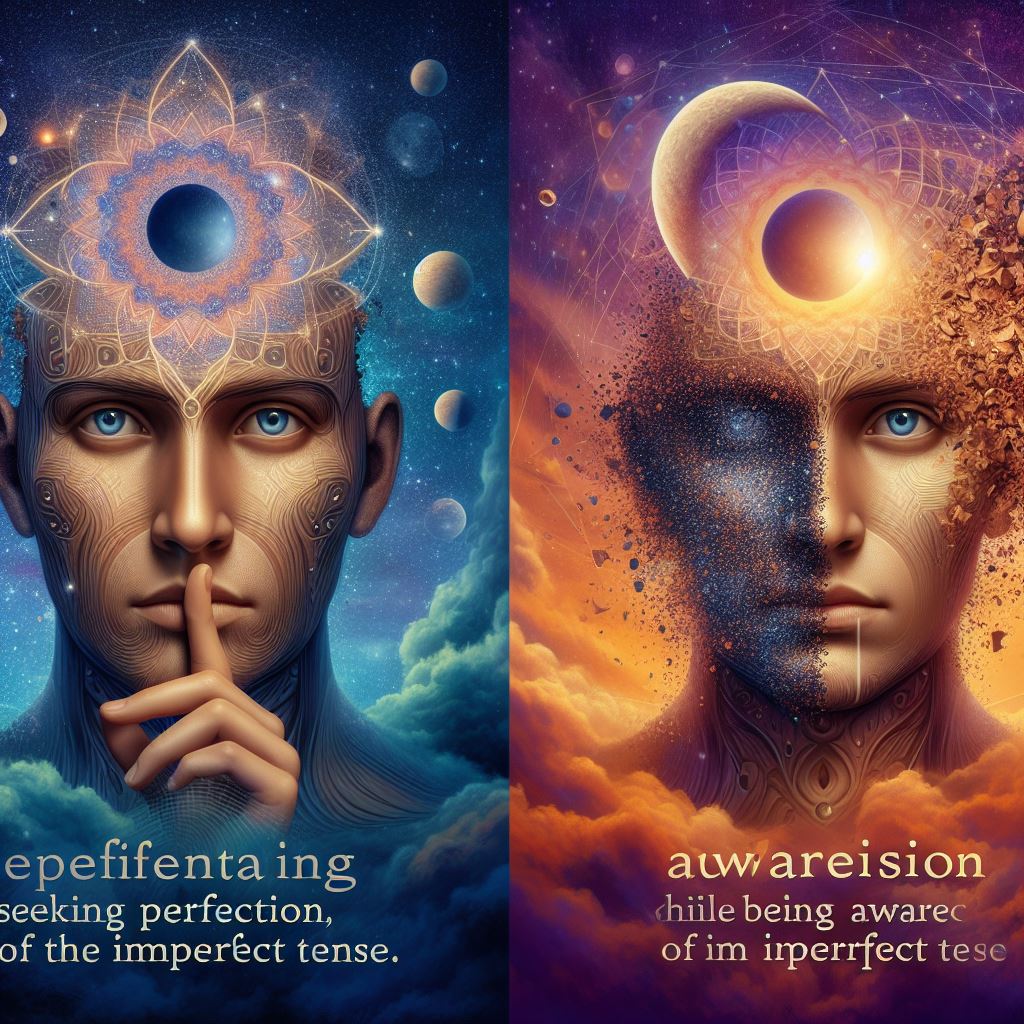The dual intention of seeking perfection and being aware of imperfect tense
The intriguing and complex concept of striving for perfection while simultaneously acknowledging the existence of imperfection calls for a harmonious balance between concentration, contemplation, and meditation. This delicate balance forms the essence of a duality that places us in a state of awareness in the vast expanse of openness, creativity, and the disruption of the mind. Understanding that this state of awareness often requires silence and observation positions the observer as the supreme entity, the almighty.
The journey towards perfection is an integral aspect of maintaining awareness during meditation. The pursuit of perfection is not about the destination but the journey. It's about acknowledging and learning from the bumps and errors encountered on trial and error. This approach values learning from mistakes and fosters personal growth and development. It encourages acquiring knowledge and wisdom through the direct experience of life's challenges and triumphs.
In the rich tapestry of the Mahayana Buddhist tradition, reading with observant skill is associated with Amitabha Buddha. It is believed that the continuous sound of "thew" and the sound of "thwa," which symbolizes Amitabha Buddha, coexist. Drawing a parallel, the Sanskrit tradition uses the simple sounds of inhalation ("so") and exhalation ("hum") to cultivate awareness of the supreme entity through the act of breathing, our most basic and essential life-sustaining function.
Cultural diversity, a fascinating aspect of human society, often originates in nostalgia and agnosticism. It's intriguing to note that the awareness of breath, as perceived by the supreme entity, extends across a wide range of traditions and practices. These diverse traditions and practices range from the customs observed in various regions of the world to the traditional attire of different nations. As the almighty shows, this awareness originates through the individual identities represented by surnames and given names.
The Upanishads, ancient Indian religious texts, introduce the principle of breath following the ritual of a ritvik, sadhu, or sacred person in the presence of the worshipped deity. It is believed that the divine breath, symbolizing the presence of the Almighty, flows through the calling doors of breath in temples. These doors are signified by the surnames and given names of individuals, signifying their unique identities. The Upanishads serve as a passage that links individuals to the divine. This principle is carefully examined and understood through literature and scriptures, which connect personal abeyance and various religious practices such as prayer, dogma, worship, or dialogue.
The process of initiating conversations often involves the usage of a person's full name or the full name of a language. This practice, though seemingly simple, holds profound implications. The almighty, the supreme entity, spells his name differently in different dialogues. This variability symbolizes his role as the origin of all that embodies beauty, sorrow, joy, and the path leading to enlightened beings.
In conclusion, the captivating concept of pursuing perfection while simultaneously recognizing and acknowledging imperfection is a journey that requires a delicate balance. This balance is achieved through concentration, contemplation, meditation, and heightened breath awareness. This awareness is perceived through the unique identities represented by our surnames and given names, forming a connection to the supreme entity.
Through the continuous pursuit of personal growth and development, we strive to attain enlightenment and gain a profound understanding of the world around us. This journey, although challenging, enriches our lives, offering us a deeper appreciation of the diverse cultures, traditions, and practices that shape human society. It urges us to look beyond the surface, encourages us to contemplate the more significant questions of existence, and ultimately leads us closer to the divine.
Please share your valuable feedback
in the comments section.....
Our company keeps things running smoothly and efficiently with the convenience of cloud-based Google Workspace programs. Google Docs lets you work and save on Google Drive, Hangouts lets you video chat, Gmail gives you a professional email, and Calendar lets you organize – from anywhere, anytime. You should also try it and see how it can help your business. Google Workspace is offering a 14-day trial. Sign up using my link, and I will give you a discount. Turn your dream into reality with Google Workspace.




Comments
Post a Comment